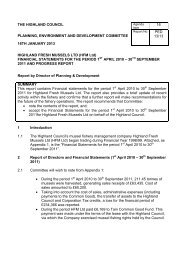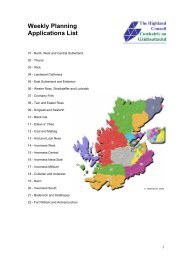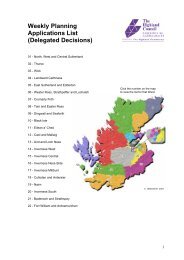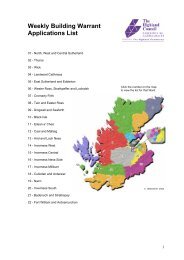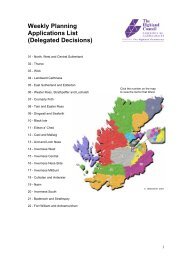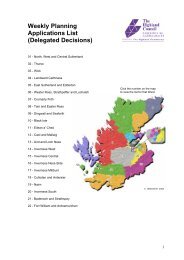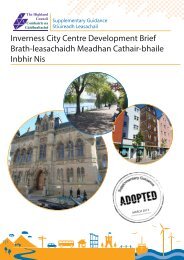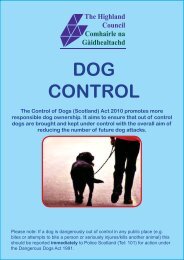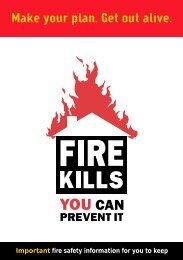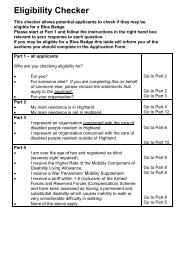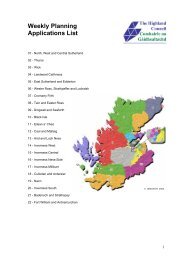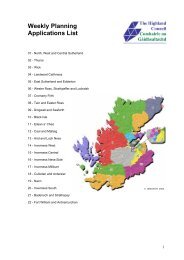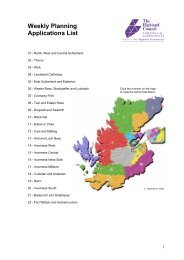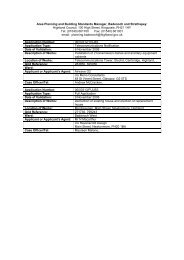Aviemore Standards Report 1314 (115kb pdf) - The Highland Council
Aviemore Standards Report 1314 (115kb pdf) - The Highland Council
Aviemore Standards Report 1314 (115kb pdf) - The Highland Council
You also want an ePaper? Increase the reach of your titles
YUMPU automatically turns print PDFs into web optimized ePapers that Google loves.
“Working together to inspire<br />
learning and achievement in<br />
<strong>Highland</strong> Communities”<br />
<strong>Standards</strong> and Quality <strong>Report</strong>:<br />
<strong>Aviemore</strong> Primary School<br />
<strong>The</strong> <strong>Highland</strong> <strong>Council</strong><br />
Education, Culture and Sport Service<br />
Badenoch & Strathspey<br />
3 rd October 2013<br />
<strong>Aviemore</strong> Primary School opened on it’s new site in August 2012 and is part of a<br />
Community building housing the School, Hall, Library and Service point, a privately<br />
run Nursery, Fitness suite, Dance studio and Meeting rooms.<br />
<strong>The</strong> school catchment is the village of <strong>Aviemore</strong> and the surrounding rural area<br />
within the Cairngorms National Park.<br />
<strong>The</strong> roll in August 2012 was 273 with the pupils organised in 11 classes. <strong>The</strong>re is<br />
also Rainbow class catering for children with severe and profound learning needs.<br />
<strong>The</strong> Headteacher is non-class committed, the Depute Head Teacher has 0.8<br />
teaching commitment and the Principal Teacher of Additional Support Needs has 0.5<br />
class commitment.<br />
<strong>Aviemore</strong> Primary School has a very positive ethos thanks to supportive staff,<br />
parents and pupils.<br />
Our school vision and values<br />
For each member of our school community to enjoy a safe and inclusive environment in<br />
which to achieve, be healthy, nurtured, active, respected and responsible.
<strong>The</strong> Core Areas of our Practice<br />
This report summarises the strengths of our school and what needs to improve. We<br />
gather this information throughout the year in a variety of ways so we can make sure<br />
our report is as accurate as possible. We reflect on the progress we have made with<br />
our improvement priorities. We take time to compare what we do with national<br />
examples of best practice. We visit each others’ classes to share standards in learning<br />
and teaching. We look at children and young people’s work to see how they are<br />
progressing. We make use of a range of data and information including attainment<br />
results. We gather the views of children, parents, staff and members of the local<br />
community. We use all of this information to arrive at our view of the quality of<br />
education we provide.<br />
Improvements through self-evaluation Key <strong>The</strong>mes: Commitment to selfevaluation<br />
Management of self-evaluation<br />
School improvement<br />
What we do well:<br />
• Teaching staff demonstrate high levels of expertise and an increasing eagerness to<br />
share experience and improve individual practice<br />
• Willingness of all staff, based on self-evaluation, to take on development roles<br />
• Good links with other schools in the Associated Schools Group (ASG) to enable<br />
enhanced self-evaluation and meaningful joint working<br />
What we need to work on:<br />
• Involve all teaching staff in professional learning community activities to raise<br />
attainment in maths across the school<br />
• Incorporate regular learning visits by all staff<br />
• Embed sharing standards in self-evaluation to improve learning experiences<br />
• Continue to improve consultation with other stakeholders in our school community<br />
• Further develop links with other schools in the Associated Schools Group (ASG) to<br />
enable enhanced self-evaluation and meaningful joint working<br />
<strong>The</strong> <strong>Highland</strong> <strong>Council</strong> Education Service Quality Improvement Team<br />
Page 2 18/11/2013
Improvements in performance<br />
Key <strong>The</strong>mes: <strong>Standards</strong> of attainment over time<br />
Overall quality of learners’ achievement<br />
Impact of the school improvement plan<br />
What we do well:<br />
• High achievement in Literacy<br />
• Children are enthusiastic and eager to learn<br />
• All staff are life-long learners<br />
What we need to work on:<br />
• Raise attainment in Maths (particularly Numeracy) through active learning<br />
• Share Assessment for Excellence testing data effectively to support teachers'<br />
judgements and use these to target support<br />
• Develop tracking systems for Literacy and Numeracy<br />
Learners’ experiences<br />
Key <strong>The</strong>me: <strong>The</strong> extent to which learners are motivated<br />
and actively involved in their own learning<br />
and development<br />
What we do well:<br />
• We have a very welcoming and inclusive ethos<br />
• Across the school children are friendly, welcoming, motivated and generally wellbehaved<br />
• Staff provide tasks and activities which are well planned to meet learners’ needs<br />
• Young people support each other in their learning<br />
• Specialists from the wider community have a positive involvement in learning<br />
• Accommodation and resources are of very good quality<br />
What we need to work on:<br />
• Ensure success criteria are effectively shared and agreed with learners<br />
• Increase opportunities for peer support<br />
• Ensure feedback is made effective through AiFL strategies and specific marking<br />
• Extend regular outdoor learning experiences for all pupils<br />
• Further embed opportunities for pupils to take responsibility for their learning<br />
<strong>The</strong> <strong>Highland</strong> <strong>Council</strong> Education Service Quality Improvement Team<br />
Page 3 18/11/2013
<strong>The</strong> curriculum Key <strong>The</strong>mes: <strong>The</strong> rationale and design of<br />
the curriculum<br />
<strong>The</strong> development of the curriculum<br />
Programmes and courses<br />
Transitions<br />
What we do well:<br />
• Curriculum for Excellence principles underpin the Curriculum and Learning and Teaching<br />
• Literacy – linking writing/reading activities to social subjects to gain depth<br />
• Introduction of innovative technologies and programmes to meet the needs of learners<br />
• All staff timetable to ensure breadth and balance across the curriculum<br />
What we need to work on:<br />
• Ensure individual challenge is built in to planning through maths challenges and mixed<br />
ability tasks<br />
• Raising attainment in Maths through the introduction of a new core scheme (HAM)<br />
• Allow time for peer mentoring in Maths<br />
• Further develop consistent planning to ensure progression of knowledge and skills at each<br />
stage<br />
Meeting learning needs Key <strong>The</strong>mes: Tasks, activities and resources<br />
Identification of learning needs<br />
<strong>The</strong> roles of teachers and specialist staff<br />
Meeting and implementing the<br />
requirements of legislation<br />
What we do well:<br />
• <strong>The</strong> school has a very welcoming and inclusive ethos<br />
• All staff are caring and strive to include all learners in all activities<br />
• Tasks and activities are well planned and differentiated to meet learning needs<br />
• Early identification of children requiring support<br />
• Pupils with additional needs are well supported<br />
• Strong multi-agency working using GIRFEC model<br />
• Transition arrangements for pupils with Additional Support Needs<br />
• IT is embedded in the learning process<br />
What we need to work on:<br />
• Continue to improve transition arrangements for P7 pupils and from Nursery to P1<br />
• Ensure best use made of additional support<br />
• Monitoring differentiation through peer to peer visits<br />
<strong>The</strong> <strong>Highland</strong> <strong>Council</strong> Education Service Quality Improvement Team<br />
Page 4 18/11/2013
Our Key Strengths<br />
Improvements through Self – Evaluation<br />
• Teaching staff demonstrate high levels of expertise and an increasing eagerness to share<br />
experience and improve individual practice<br />
Improvements in Performance<br />
• Children are enthusiastic and eager to learn<br />
Learners’ Experiences<br />
• Young people support each other in their learning<br />
<strong>The</strong> Curriculum<br />
• Curriculum for Excellence principles underpin the Curriculum and Learning and Teaching.<br />
Meeting Learning Needs<br />
• Tasks and activities are well planned and differentiated to meet learning needs<br />
Our Priorities For Improvement<br />
Improvements through Self – Evaluation<br />
• Involve all teaching staff in professional learning community activities to raise attainment<br />
in maths across the school<br />
Improvements in Performance<br />
• Raise attainment and improve standards in Maths, particularly Numeracy and Mental<br />
Maths.<br />
Learners’ Experiences<br />
• Extend regular outdoor learning experiences for all pupils<br />
<strong>The</strong> Curriculum<br />
• Raising attainment in Maths through the introduction of a new core scheme (HAM)<br />
Meeting Learning Needs<br />
• Continue to improve transition arrangements for P7 pupils and from Nursery to P1<br />
Additional Priorities<br />
• Develop tracking systems for Literacy and Numeracy<br />
<strong>The</strong> <strong>Highland</strong> <strong>Council</strong> Education Service Quality Improvement Team<br />
Page 5 18/11/2013



